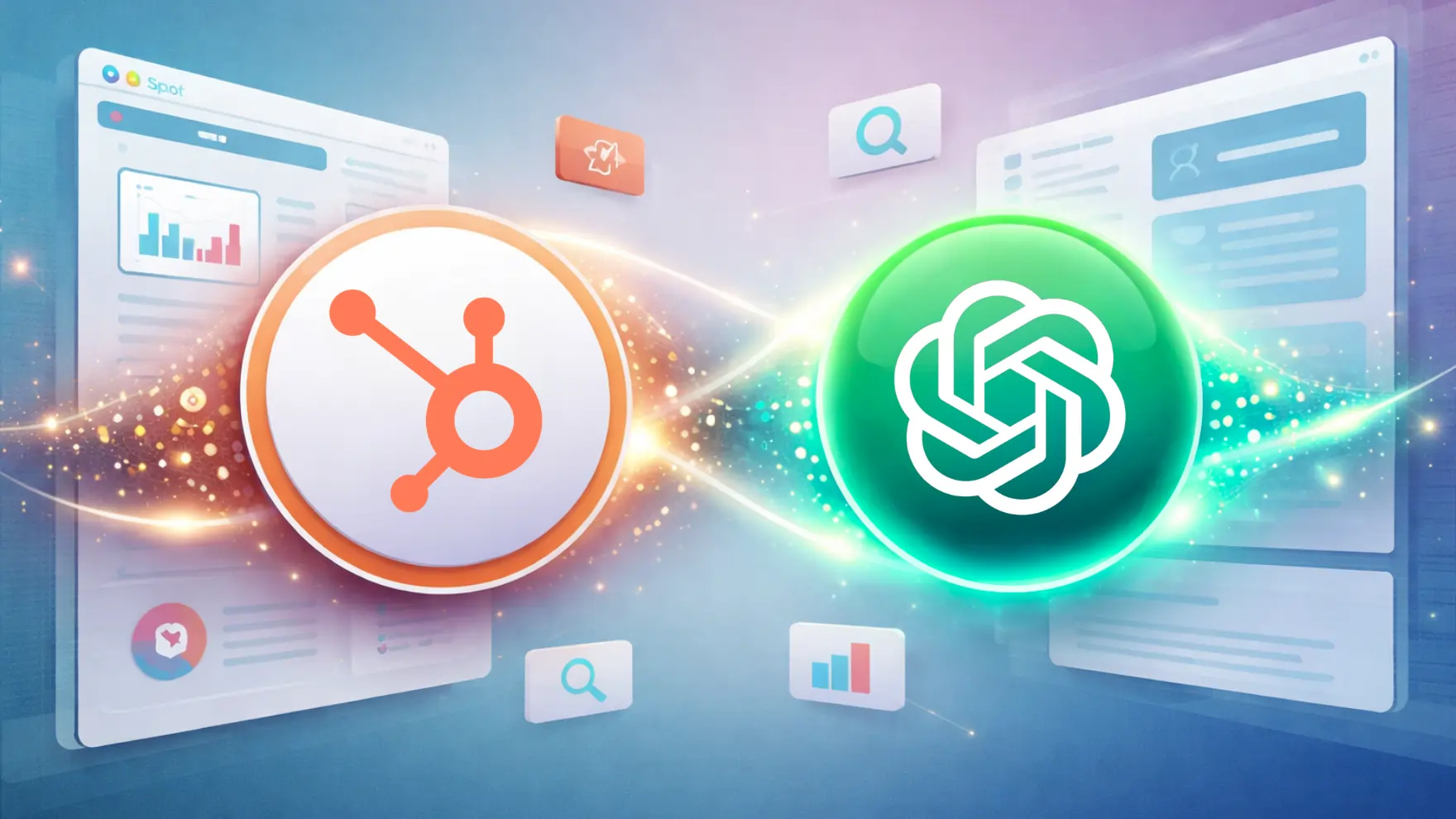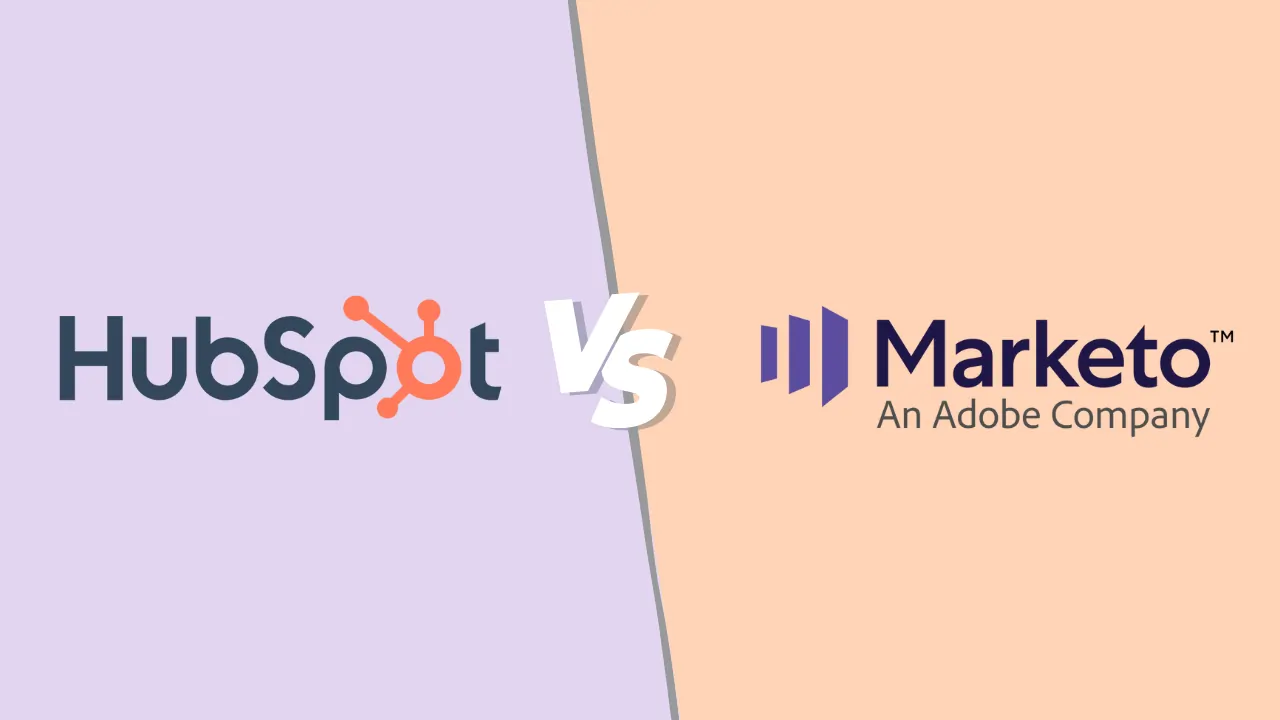Pipedrive vs Monday CRM: Which is better for small business sales in 2026?
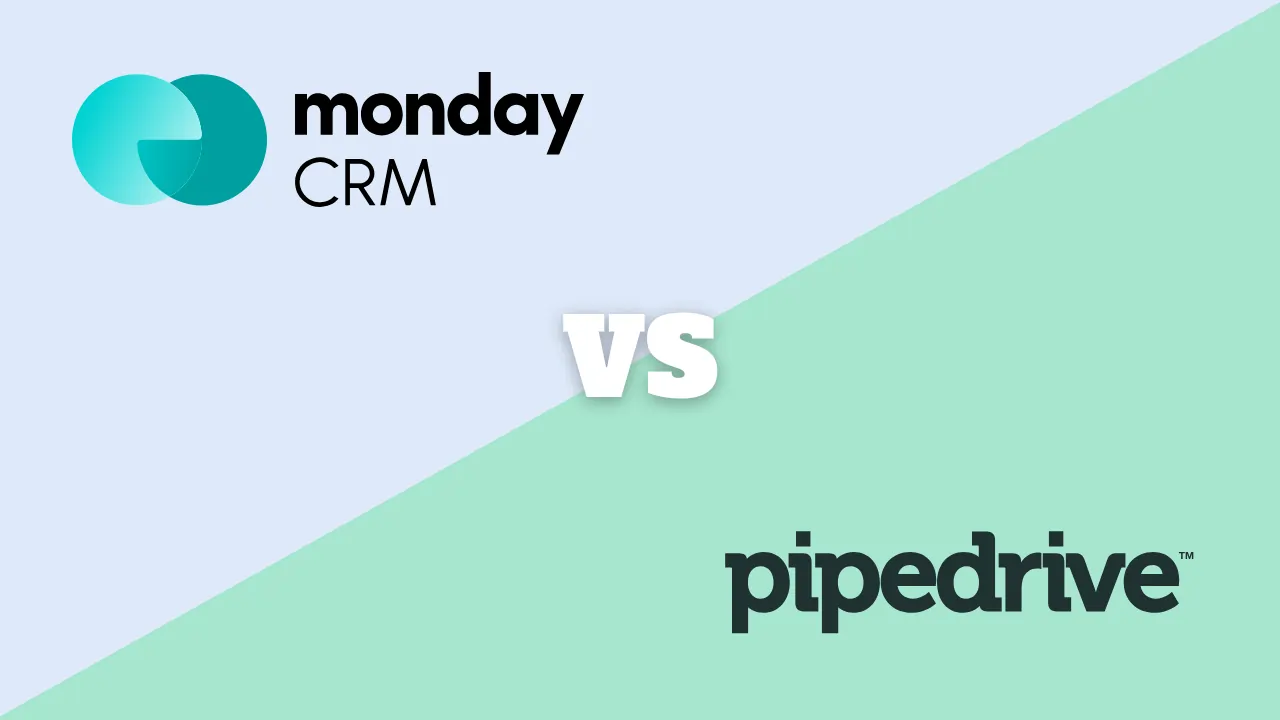
Choosing your first (or next) CRM for small business can be quite a task. You’re likely drowning in spreadsheets, missing follow-ups, and letting valuable leads slip through the cracks. It’s a common problem, and two names you’ll see everywhere in your search are Pipedrive and Monday Sales CRM.
But here’s the critical part: while they both aim to manage customer relationships, their core philosophies are completely different.
Pipedrive is a dedicated, sales-first CRM. It was built by salespeople, for salespeople, with one goal: to make you close deals. It’s a focused, visual, and action-oriented tool designed to perfect your sales pipeline.
Monday Sales CRM is a sales product built on top of the highly flexible Monday.com “Work OS” (Work Operating System). Its goal is to be the single, customizable platform where you can run your entire business—from sales and marketing to project management and operations.
So, are you looking for a specialized tool to empower your sales team, or a central hub to run your whole company? We’ll compare the key differences in features, ease of use, and the all-important pricing to give you a clear, data-driven answer on which is the right fit for your business.
Key points (quick summary)
- Pipedrive is best for… dedicated sales teams (of any size) who want an intuitive, powerful, and pipeline-centric tool to manage leads and deals.
- Monday Sales CRM is stronger in… platform customization and all-in-one team collaboration. It’s ideal for businesses that need sales, project management, and other departments to work together on one platform.
- The main difference in pricing is… Pipedrive charges per user, starting with one. Monday Sales CRM pricing has a 3-seat minimum on all its paid plans, making it more expensive for solo users or teams of two.
- The key feature that separates them is… Pipedrive’s simplicity and singular focus on the sales pipeline versus Monday’s extreme customization and “all-in-one” ecosystem.
- The ideal audience for Pipedrive is… sales reps, sales managers, and small businesses whose primary bottleneck is the sales process itself.
- The ideal audience for Monday Sales CRM is… teams that want to manage the entire customer lifecycle, from lead to quote to project delivery, in one place.
Head-to-head comparison
Market position & ideal use cases
Pipedrive is a pure, sales-focused CRM. Its entire brand philosophy is built around “activity-based selling”—the idea that you can’t control outcomes (like a closed deal), but you can control the actions that lead to them (like calls, emails, and meetings). It’s built for sales teams who live in their sales pipeline and need a tool that clears away the admin work and tells them what to do next. It’s ideal for SMBs in industries like real estate, agencies, and B2B services.
Monday Sales CRM is one product in the larger Monday.com ecosystem. Its philosophy is about a “Work OS,” a central, visual, and highly flexible platform to build any workflow you need. Its ideal use case isn’t just for the sales team; it’s for the whole company. It shines when your sales process is directly tied to other business functions, like marketing campaigns, client onboarding, or project delivery.
Platform & ecosystem: Customization vs. focus
This is not a hardware comparison, but a platform one.
- Pipedrive is a standalone, best-in-class application. Its ecosystem consists of its robust mobile apps (iOS and Android) and a large marketplace of over 400 third-party integrations (like Slack, Google Workspace, and accounting software). You use Pipedrive for sales and connect it to other tools for other functions.
- Monday Sales CRM is a product within the Monday.com platform. Its greatest strength is its native ecosystem. You can have your sales pipeline on one “board” and your client onboarding projects on another, and they can be seamlessly connected. Its ecosystem is itself. It also has a large app marketplace for connecting external tools.
Core features & capabilities: Sales pipeline vs. work management
| Feature | Pipedrive | Monday Sales CRM |
| Main interface | A visual, drag-and-drop sales pipeline. | Customizable “boards” that can be viewed as Kanban, a spreadsheet, a timeline, etc. |
| Lead management | Strong lead inbox, web forms, and a “LeadBooster” add-on (chatbot, live chat). | Built-in lead capturing via web forms, and customizable lead management boards. |
| Deal management | The core strength. Tracks deals, activities, and communication for each stage. | Highly flexible. You build your deal pipeline, but also your contact and account boards. |
| Email integration | 2-way sync with Google and Microsoft. Email tracking, templates, and scheduling. | Full email sync, tracking, and the ability to send and receive emails from within a contact’s “item”. |
| Quotes & invoices | Available on higher plans (Professional+) to create, send, and track quotes. | Available on higher plans (Pro+) to create and manage quotes and invoices. |
Reporting, analytics & insights
Pipedrive offers powerful, out-of-the-box reports built for sales managers. You can easily track key metrics like conversion rates, deal velocity, and sales rep activity. The dashboards are clear, sales-focused, and designed to help you spot bottlenecks in your sales pipeline and forecast revenue.
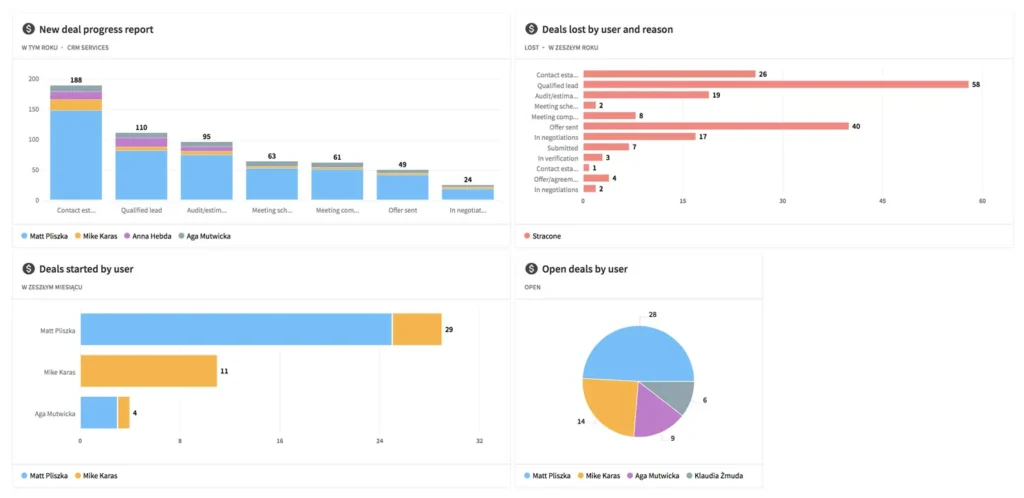
Monday Sales CRM provides highly visual and customizable dashboards. You can build reports from scratch using various “widgets” (charts, graphs, numbers) and pull in data from any board. This is a huge advantage if you want to see, for example, how many “won deals” have successfully “completed onboarding” on a single dashboard. It’s less of a pure sales reporting tool and more of a flexible business intelligence (BI) dashboard.
Integrations & connected tools: Building your tech stack
A CRM is only as good as the tools it works with. Here, Pipedrive and Monday show their different philosophies.
Pipedrive: The ‘Best-of-Breed’ hub
Pipedrive is built to be the central nervous system for sales, connecting to other specialized tools for marketing, finance, and support. Its marketplace features over 400 apps.
- Marketplace size: Over 400 third-party applications.
- Key integrations:
- Finance & accounting: Deep integration with QuickBooks and Xero. You can create invoices directly from a deal and sync customer data, which saves your finance team hours of manual entry.
- Marketing automation: Connects to Mailchimp, HubSpot, ActiveCampaign, and more. This allows you to automatically add “won” deals to a “new customer” email list or send new leads from your marketing tool directly into Pipedrive’s pipeline.
- Communication: Integrates deeply with Google Workspace and Microsoft 365 for 2-way email and calendar sync. Slack integrations let you get deal notifications or even create a new deal from a Slack message.
- Support: Connects to tools like Zendesk and Intercom, allowing reps to see support ticket history on a contact’s page.
Monday Sales CRM: The ‘All-in-One’ platform
Monday’s greatest strength is its native integration with its own product suite (like Monday Projects or Monday Marketer). Its external marketplace is smaller (200+ apps) but growing, and it relies heavily on its own automation “recipes” to connect.
- Marketplace size: Over 200+ third-party applications.
- Key integrations:
- Native ecosystem: This is its main selling point. You can build an automation like, “When a deal status changes to ‘Won,’ create a new project in the ‘Client Onboarding’ board, assign the PM, and populate it with tasks.” This is a true project management CRM capability.
- Finance & accounting: Also offers integration with QuickBooks and Xero, though the setup is often managed through its automation recipes.
- Marketing automation: Connects to HubSpot, Mailchimp, and others. You can, for example, automatically create a new lead item on your board from a HubSpot form submission.
- Communication: Integrates with Slack, Google Workspace, and Microsoft 365. Its automations for these are powerful (e.g., “When a due date arrives, send a Slack notification to the deal owner.”).
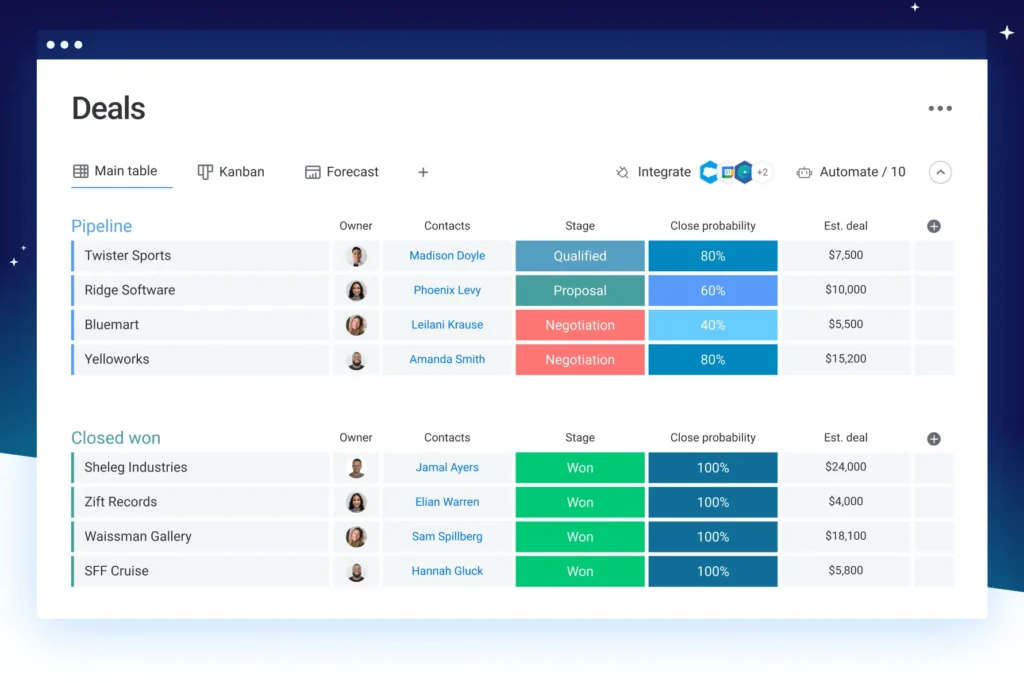
API & custom solutions:
Both platforms offer robust, well-documented REST APIs for custom solutions. For a small business, this means you can hire a developer to build a unique connection to a proprietary tool you use. Monday’s API is central to its “Work OS” identity, allowing deep manipulation of its board structure. Pipedrive’s API is more focused on sales objects like deals, people, and activities.
AI, automation & smart features
Pipedrive features an “AI Sales Assistant” that analyzes your past performance to suggest your next-best action, identify deals at risk, and highlight opportunities. It also has a straightforward workflow automation builder for tasks like “When a deal moves to ‘Proposal,’ create a follow-up activity.”
Monday Sales CRM has one of the most robust and user-friendly “no-code” automation builders on the market. You can create complex, multi-step “recipes” (if-then logic) that work across your entire account. It is also rolling out “Monday AI” which can help summarize notes, write follow-up emails, and generate tasks from text.
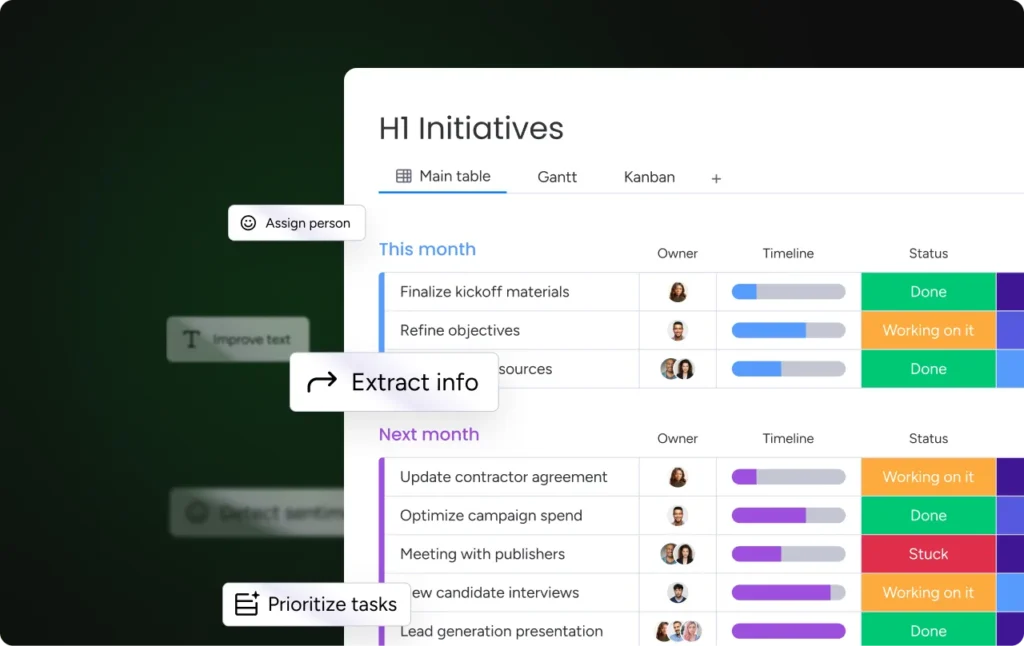
Pricing & fee comparison: Pipedrive vs Monday CRM
This is one of the most critical key differences for a small business. Both platforms are billed per user, per month.
Pipedrive Pricing
Pipedrive offers five tiers, and you can start with a single user. This makes it a great CRM for small business or even solo entrepreneurs.
- Essential: Basic pipeline and lead management.
- Advanced: Adds automation, email sync, and scheduling.
- Professional: Adds quoting, more reporting, and call tracking.
- Power: Adds project management features and deeper analytics.
- Enterprise: For large-scale needs.
(Source: Pipedrive official website)
Monday Sales CRM Pricing
Monday Sales CRM offers four main tiers, but all paid plans have a 3-user seat minimum.
- Basic (min 3 seats): Basic pipelines, unlimited contacts, lead-capturing forms.
- Standard (min 3 seats): Adds automations, integrations, and more advanced reporting.
- Pro (min 3 seats): Adds sales forecasting, multiple pipelines, and quoting.
- Enterprise: For large-scale needs.
(Source: Monday.com official website)
The 3-seat minimum for Monday Sales CRM pricing is a deal-breaker for solo founders or 2-person teams. Pipedrive pricing is significantly more accessible for businesses just starting out.
Support, reliability & customer experience
Pipedrive is known for its strong customer support. All paying plans get 24/7 support via live chat and email. Higher-tier plans (Power and Enterprise) also get access to phone support.
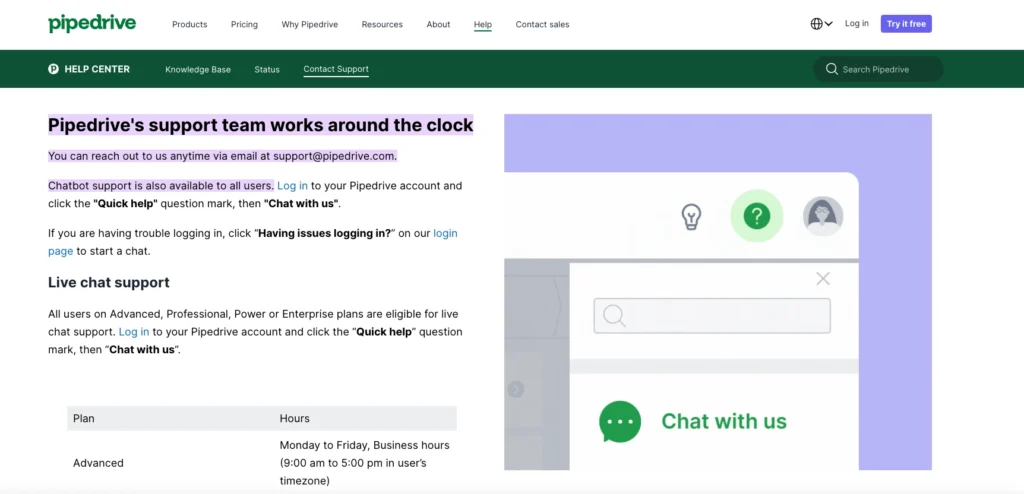
Monday Sales CRM also provides 24/7 email and chat support. Higher-tier plans (Pro and Enterprise) get a dedicated Customer Success Manager and priority response times, which is a premium onboarding and support experience.
Scalability & growth potential
Pipedrive scales exceptionally well for sales teams. As your team grows from 5 to 50, Pipedrive’s features for team management, reporting, and territory management grow with you. It remains a sales-focused tool.
Monday Sales CRM scales exceptionally well for the entire business. As you grow, you won’t just scale your sales team; you’ll add your client services, marketing, and operations teams onto the Monday “Work OS.” Its scalability is in its breadth and its ability to become the central nervous system for your whole company.
Real-world scenarios / use case analysis
Example 1: The 5-person B2B consulting firm
- Need: The team’s primary goal is to move leads from “Initial Contact” to “Proposal Sent” to “Won.” They live on the phone and in their email. They don’t manage complex projects after the sale.
- Better choice: Pipedrive.
- Reason: It’s built for exactly this. The team can log in, see their sales pipeline, and immediately know which activities they need to complete today to close deals. The sales-focused reporting will let the managing partner see which consultant is performing best.
Example 2: The 20-person digital marketing agency
- Need: The sales team needs to track leads, but once a deal is “Won,” a massive handoff occurs. A project manager needs to build a project plan, designers need to create assets, and copywriters need to be assigned tasks.
- Better choice: Monday Sales CRM.
- Reason: The agency can create an automation: “When a deal in the ‘Sales Pipeline’ board is moved to ‘Won,’ automatically create a new client project in the ‘Client Projects’ board and assign the project manager.” This single-platform, project management CRM workflow is Monday’s superpower.
Final verdict & recommendation table
Reporting, analytics & insights
Pipedrive offers powerful, out-of-the-box reports built for sales managers. You can easily track key metrics like conversion rates, deal velocity, and sales rep activity. The dashboards are clear, sales-focused, and designed to help you spot bottlenecks in your sales pipeline and forecast revenue.
Monday Sales CRM provides highly visual and customizable dashboards. You can build reports from scratch using various “widgets” (charts, graphs, numbers) and pull in data from any board. This is a huge advantage if you want to see, for example, how many “won deals” have successfully “completed onboarding” on a single dashboard. It’s less of a pure sales reporting tool and more of a flexible business intelligence (BI) dashboard.
Integrations & connected tools: Building your tech stack
A CRM is only as good as the tools it works with. Here, Pipedrive and Monday show their different philosophies.
Pipedrive: The ‘Best-of-Breed’ hub
Pipedrive is built to be the central nervous system for sales, connecting to other specialized tools for marketing, finance, and support. Its marketplace features over 400 apps.
- Marketplace size: Over 400 third-party applications.
- Key integrations:
- Finance & accounting: Deep integration with QuickBooks and Xero. You can create invoices directly from a deal and sync customer data, which saves your finance team hours of manual entry.
- Marketing automation: Connects to Mailchimp, HubSpot, ActiveCampaign, and more. This allows you to automatically add “won” deals to a “new customer” email list or send new leads from your marketing tool directly into Pipedrive’s pipeline.
- Communication: Integrates deeply with Google Workspace and Microsoft 365 for 2-way email and calendar sync. Slack integrations let you get deal notifications or even create a new deal from a Slack message.
- Support: Connects to tools like Zendesk and Intercom, allowing reps to see support ticket history on a contact’s page.
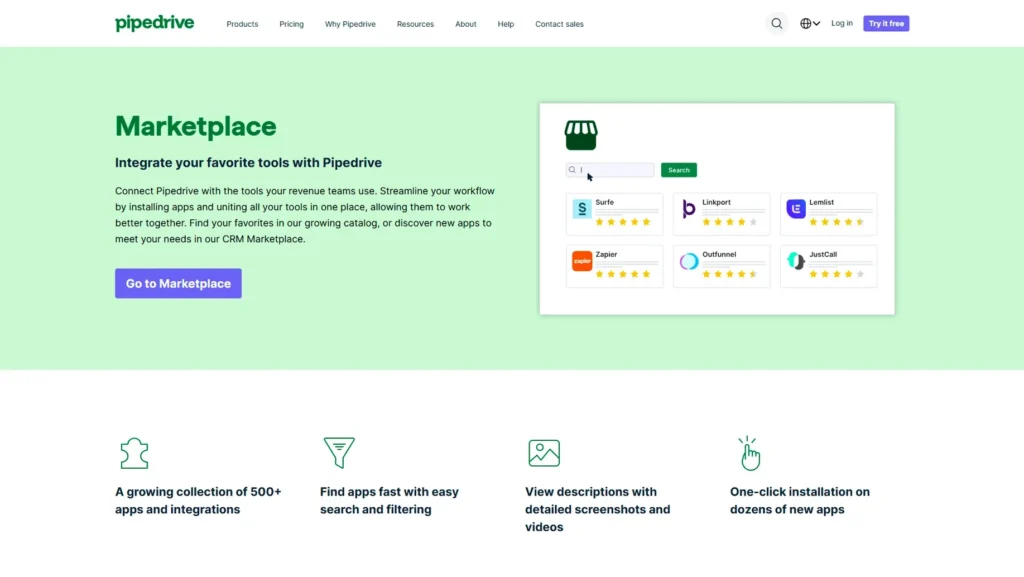
Monday Sales CRM: The ‘All-in-One’ platform
Monday’s greatest strength is its native integration with its own product suite (like Monday Projects or Monday Marketer). Its external marketplace is smaller (200+ apps) but growing, and it relies heavily on its own automation “recipes” to connect.
- Marketplace size: Over 200+ third-party applications.
- Key integrations:
- Native ecosystem: This is its main selling point. You can build an automation like, “When a deal status changes to ‘Won,’ create a new project in the ‘Client Onboarding’ board, assign the PM, and populate it with tasks.” This is a true project management CRM capability.
- Finance & accounting: Also offers integration with QuickBooks and Xero, though the setup is often managed through its automation recipes.
- Marketing automation: Connects to HubSpot, Mailchimp, and others. You can, for example, automatically create a new lead item on your board from a HubSpot form submission.
- Communication: Integrates with Slack, Google Workspace, and Microsoft 365. Its automations for these are powerful (e.g., “When a due date arrives, send a Slack notification to the deal owner.”).
API & custom solutions:
Both platforms offer robust, well-documented REST APIs for custom solutions. For a small business, this means you can hire a developer to build a unique connection to a proprietary tool you use. Monday’s API is central to its “Work OS” identity, allowing deep manipulation of its board structure. Pipedrive’s API is more focused on sales objects like deals, people, and activities.
AI, automation & smart features
Pipedrive features an “AI Sales Assistant” that analyzes your past performance to suggest your next-best action, identify deals at risk, and highlight opportunities. It also has a straightforward workflow automation builder for tasks like “When a deal moves to ‘Proposal,’ create a follow-up activity.”
Monday Sales CRM has one of the most robust and user-friendly “no-code” automation builders on the market. You can create complex, multi-step “recipes” (if-then logic) that work across your entire account. It is also rolling out “Monday AI” which can help summarize notes, write follow-up emails, and generate tasks from text.
Pricing & fee comparison: Pipedrive vs Monday CRM
This is one of the most critical key differences for a small business. Both platforms are billed per user, per month.
Pipedrive Pricing
Pipedrive offers five tiers, and you can start with a single user. This makes it a great CRM for small business or even solo entrepreneurs.
- Essential: Basic pipeline and lead management.
- Advanced: Adds automation, email sync, and scheduling.
- Professional: Adds quoting, more reporting, and call tracking.
- Power: Adds project management features and deeper analytics.
- Enterprise: For large-scale needs.
(Source: Pipedrive official website)
Monday Sales CRM Pricing
Monday Sales CRM offers four main tiers, but all paid plans have a 3-user seat minimum.
- Basic (min 3 seats): Basic pipelines, unlimited contacts, lead-capturing forms.
- Standard (min 3 seats): Adds automations, integrations, and more advanced reporting.
- Pro (min 3 seats): Adds sales forecasting, multiple pipelines, and quoting.
- Enterprise: For large-scale needs.
(Source: Monday.com official website)
The 3-seat minimum for Monday Sales CRM pricing is a deal-breaker for solo founders or 2-person teams. Pipedrive pricing is significantly more accessible for businesses just starting out.
Support, reliability & customer experience
Pipedrive is known for its strong customer support. All paying plans get 24/7 support via live chat and email. Higher-tier plans (Power and Enterprise) also get access to phone support.
Monday Sales CRM also provides 24/7 email and chat support. Higher-tier plans (Pro and Enterprise) get a dedicated Customer Success Manager and priority response times, which is a premium onboarding and support experience.
Scalability & growth potential
Pipedrive scales exceptionally well for sales teams. As your team grows from 5 to 50, Pipedrive’s features for team management, reporting, and territory management grow with you. It remains a sales-focused tool.
Monday Sales CRM scales exceptionally well for the entire business. As you grow, you won’t just scale your sales team; you’ll add your client services, marketing, and operations teams onto the Monday “Work OS.” Its scalability is in its breadth and its ability to become the central nervous system for your whole company.
Real-world scenarios / use case analysis
Example 1: The 5-person B2B consulting firm
- Need: The team’s primary goal is to move leads from “Initial Contact” to “Proposal Sent” to “Won.” They live on the phone and in their email. They don’t manage complex projects after the sale.
- Better choice: Pipedrive.
- Reason: It’s built for exactly this. The team can log in, see their sales pipeline, and immediately know which activities they need to complete today to close deals. The sales-focused reporting will let the managing partner see which consultant is performing best.
Example 2: The 20-person digital marketing agency
- Need: The sales team needs to track leads, but once a deal is “Won,” a massive handoff occurs. A project manager needs to build a project plan, designers need to create assets, and copywriters need to be assigned tasks.
- Better choice: Monday Sales CRM.
- Reason: The agency can create an automation: “When a deal in the ‘Sales Pipeline’ board is moved to ‘Won,’ automatically create a new client project in the ‘Client Projects’ board and assign the project manager.” This single-platform, project management CRM workflow is Monday’s superpower.
Final verdict & recommendation table
| Best Choice | Reason | |
| Ease of use | Pipedrive | It’s highly intuitive for its one core purpose: sales. Monday’s flexibility can create a steeper learning curve. |
| Sales-specific features | Pipedrive | The entire platform is built around the sales pipeline, activity-based selling, and deal management. |
| All-in-one platform | Monday Sales CRM | Its ability to natively connect sales to project management and other operations is unmatched. |
| Pricing value (1-2 users) | Pipedrive | The lack of a seat minimum makes it the clear choice. Monday is a non-starter here. |
| Pricing value (3+ users) | Tie | The cost becomes comparable, and the decision should be based 100% on features. |
| Best for sales-only teams | Pipedrive | It provides a focused, powerful tool without the distraction of features you don’t need. |
| Best for fast-growth ops | Monday Sales CRM | It’s a platform that can scale with your entire business, not just your sales department. |
FAQ: Pipedrive vs Monday CRM
1. Is Monday a true CRM?
Yes, Monday.com offers a dedicated product called Monday Sales CRM. It’s built on their flexible “Work OS” platform but includes all the core CRM features: lead management, deal pipelines, contact databases, and sales reporting.
2. Which is cheaper, Pipedrive or Monday?
For solo users or 2-person teams, Pipedrive is significantly cheaper because it bills per user, starting at one. Monday Sales CRM requires a 3-seat minimum, so your starting price will always be for three users. For teams of 3 or more, their prices are comparable.
3. Is Pipedrive a good Monday CRM alternative?
Yes, Pipedrive is an excellent Monday CRM alternative, especially if you find Monday too complex or focused on project management. If you want a tool that is 100% dedicated to sales and easier to learn, Pipedrive is a top competitor.
4. What are the key differences between Pipedrive and Monday?
The main difference is focus. Pipedrive is a specialized sales tool for managing pipelines. Monday is a general “Work OS” (work operating system) that can be customized to act as a CRM, project manager, and more, all in one.
5. How is the customer support for each?
Both offer 24/7 email and chat support. Higher-tier plans on both platforms offer more dedicated support, like phone access (Pipedrive) or a dedicated Customer Success Manager (Monday).
6. Which has better integration with QuickBooks?
Both have good integration with QuickBooks. Pipedrive often has a more direct, out-of-the-box integration for creating invoices from deals. Monday’s integration is also powerful but is often configured through its “recipe” automation builder.
7. Is Pipedrive easier to use than Monday?
For a salesperson, Pipedrive is generally considered easier to learn because its interface is designed for one job: managing a sales pipeline. Monday is easy for simple tasks, but its high degree of customization means there’s a steeper learning curve to set it up perfectly.


